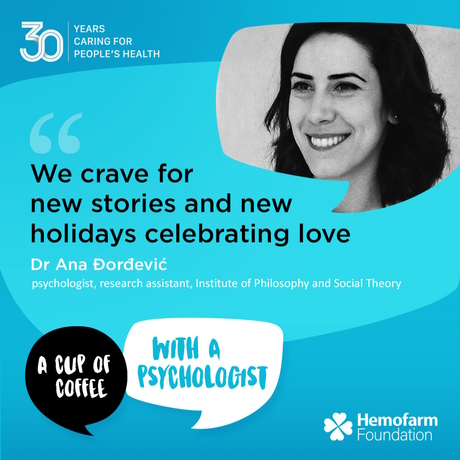
01/02/2023
What is love? What is an illusion of love?
Dr Ana Đorđević
psychologist, research assistant, Institute of Philosophy and Social Theory
What is love? What is an illusion of love?
It’s Valentine's Day. We can perceive it as a day when a large part of the world celebrates love or as a day that shows the extent to which love today is commercialized, massified, reduced to stereotyped words and products, to clichés. I wander how much will people truly connect during this holiday with the love inside them, with persons they love, with the reasons why they fell in love with them in the first place. If we go to more details, with the moments in which they recognized that love between them, the events that made it up, the various sentences they said to express it, the people they shared it with. These are all the pieces of the puzzle that create each unique love story of two (or more) people.
Nevertheless, most of us lives within the clichés, the usual myths about love like the one ’love at first sight’ or ’prince charming’, trying to put in a box and capture their authentic, vital, special feelings and trap them in that one machinery that gives everything the same shape, and depriving them of lived wholeness and reality of each individual love. By watching love movies, listening to pop music and reading bestsellers, we learn what to look for from the perspective of the globalized love market, how and what to expect. We become numb for any kind of specificity, and we compare the reality of our love story with the standards of average romantic comedy. Our enthusiasm, excitement and curiosity when falling in love and that calmness in mutual acceptance and understanding without any disturbances, turn into a stale routine in which we stop even noticing that the other person exists. From anniversary to anniversary, from one Valentine's Day to another. Everything becomes one.
Back in the last century, some psychologists tried to fathom what love is. According to contemporary research, love is composed of three components: intimacy, passion, commitment. However, even they were clear that an analysis of love would not reveal the ’truth’ about it, it would only reduce it to something that in the aggregate was always less than itself. Even when these three components dance in perfect harmony, understanding it does not bring us any closer to realization the essence of love. Therefore this group of psychologists turned to considering the content, rather than the form of love and came to the discovery that actually each of us - taking into account unique life paths, early family relationships, traumatic events, significant people, but also culturally specific folk beliefs about love and relationships that were passed on through generations – have their own (one or more) story about love. When we are not guided by the above stereotypes, we are driven by the unconscious influence of these stories. Those stories carry their own theme and logic, contain only the specific meaning, placed in the relationships between different roles, they are even clairvoyant in some sense, because they also contain beliefs about what could happen. People choose their partners to fit into their love stories, but in complementary roles. There can be endless stories, but they are all grouped in several dozen ’typical’ ones. Some of them are fatal, because they are based on a large disproportion of power between one person and another. A lot of those stories are simply acting out and trying to resolve some early traumas; they have their own goal. Most of them actually fit well the social orders and ideologies, such as neoliberalism and patriarchy. Although almost all of us have a story about love that we very often perform again and again like a play, most of us also have an ideal story about love, what we think love should look like...
Our love achievements, but also our longings, unfulfilled wishes, suffering or inability to find love are based on these stories. Entering relationships with people with whom we do not share the story or repeating a bad story leads to the failure of those relationships and our disappointments with others or with ourselves. How about instead of remembering love on Valentine's Day and reaching for one of the three types of typical gifts, we try to understand and unpack our story of love, and with it, what we strive for and what is good for us? Or to create new stories - and with them new relationships, new gifts, new sentences and, of course, new unique holidays.

AUTHOR
Dr Ana Đorđević
psychologist, research assistant, Institute of Philosophy and Social Theory